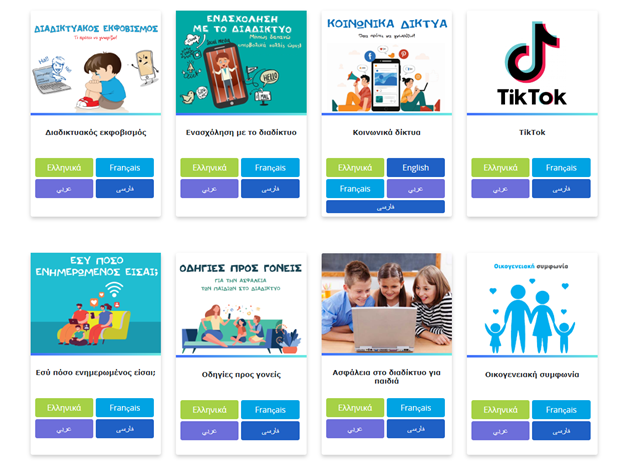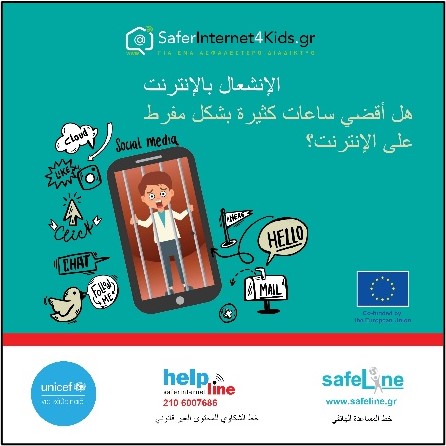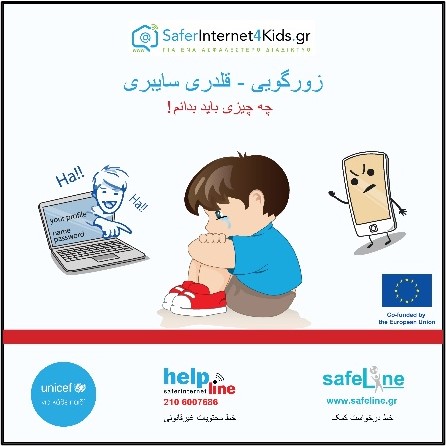The Greek Safer Internet Centre (SIC) and the Greek Ministry of Education, with the support of UNICEF, are joining forces to promote online safety and digital citizenship education specifically designed for migrant and refugee children living in Greece.

Over the past few months, the Greek Safer Internet Centre, in collaboration with the Greek Ministry of Education and with the support of UNICEF, has engaged in a joint effort with one common mission: to empower and support migrant and refugee children upon their arrival in Greece by providing constructive education and guidance ensuring safe and positive online experiences.
The aim is to bridge the gap of digital inequalities and risks, ensuring safe positive digital experiences for migrant and refugee children that will enable them to overcome barriers and unlock new opportunities, thus fostering their development as responsible digital citizens.
Greece is a gateway to Europe for migrants
Situated at the southeastern edge of Europe, Greece serves as a major gateway in Europe for migrant and refugee populations. Since 2015, Greece has welcomed over a million individuals, 37 per cent of them being children. Currently, it is estimated that a total of 44,500 refugee and migrant children have lived in Greece since 2020, out of which 4,000 are unaccompanied minors, and thus particularly vulnerable. The arrival of unaccompanied children in Greece – without any family members, guardians or tutors – exposes them to increased risks, aggravated by the fact that many of these minors have experienced extended periods without formal education or have never received any formal education. In recent years, there has been a significant increase in the number of children arriving in Greece, particularly those who arrive unaccompanied or have been separated from their families.
As per the Ministry of Education's records, during the academic year 2021-2022, Greek schools welcomed a total of 16,417 students who were refugees, out of which 12,285 actively attended classes. When it comes to education, in the context of a humanitarian crisis, teachers encounter numerous challenges when working with refugee and migrant children. These challenges are often attributed to interruptions in their education or their lack of prior schooling experience.
Digital inequality within the immigrant community
The evidence clearly shows that members of the immigrant community in Greece, but also internationally, experience significantly higher levels of digital inequality and exclusion compared to the average population. Not only do minors from this community have limited access to online opportunities, but they are also more vulnerable to online risks.
Furthermore, even if they encounter the same level of online risks as others, the consequences can be far more severe for them. Digital inequality also has a profound impact on the personal development, relationships, education, and upbringing of children and teenagers.
Migrant and refugee children face additional barriers in accessing secure and positive online experiences, making them more susceptible to online risks. Protecting these children from cyberbullying, hate speech, fraud, grooming, blackmail, sextortion, and exposure to inappropriate content is a challenging task of utmost importance.

The work of the Greek SIC and its partners
The Greek Safer Internet Centre, SaferInternet4Kids, in collaboration with the Ministry of Education and with the support of UNICEF, have jointly engaged in an effort to educate the migrant and refugee communities in Greece. To achieve this goal, a survey was initially conducted to identify the prevalent languages most widely spoken by immigrant children in Greece, as well as to assess the special educational needs these children might have.
The survey findings indicated that Arabic, Persian (Farsi), and French are the most prevalent languages among migrant and refugee children in social structures across Greece, and identified the issues which are most relevant and needed in the community of migrant and refugee children such as hate speech, cyberbullying, sexting, sextortion and scams.
In partnership with UNICEF, a collaborative effort was undertaken to translate various informative and educational materials into the three predominant languages among migrant children: Arabic, Farsi, and French. These materials included pamphlets addressing topics such as cyberbullying, excessive internet usage, social media, parental guidance, etc. Additionally, a comprehensive toolkit on online safety was developed.
All the materials are available on the Greek SIC portal.
Moreover, a series of online webinars were hosted for educational coordinators working with refugee children, as well as educators who have migrant children in their classrooms.
The Greek Safer Internet Centre is determined to continue and expand this collaborative initiative, aiming to reach as many migrant children in Greece as possible. Ensuring online safety and enabling access to the opportunities provided by the digital world are fundamental rights that every child, including those in vulnerable circumstances, should have in today's society, as they are crucial for a child’s growth and development.


Find more information about the work of the Greek Safer Internet Centre, including its awareness raising, helpline, hotline, and youth participation services – or find similar information for other Safer Internet Centres throughout Europe.
The Greek Safer Internet Centre (SIC) and the Greek Ministry of Education, with the support of UNICEF, are joining forces to promote online safety and digital citizenship education specifically designed for migrant and refugee children living in Greece.

Over the past few months, the Greek Safer Internet Centre, in collaboration with the Greek Ministry of Education and with the support of UNICEF, has engaged in a joint effort with one common mission: to empower and support migrant and refugee children upon their arrival in Greece by providing constructive education and guidance ensuring safe and positive online experiences.
The aim is to bridge the gap of digital inequalities and risks, ensuring safe positive digital experiences for migrant and refugee children that will enable them to overcome barriers and unlock new opportunities, thus fostering their development as responsible digital citizens.
Greece is a gateway to Europe for migrants
Situated at the southeastern edge of Europe, Greece serves as a major gateway in Europe for migrant and refugee populations. Since 2015, Greece has welcomed over a million individuals, 37 per cent of them being children. Currently, it is estimated that a total of 44,500 refugee and migrant children have lived in Greece since 2020, out of which 4,000 are unaccompanied minors, and thus particularly vulnerable. The arrival of unaccompanied children in Greece – without any family members, guardians or tutors – exposes them to increased risks, aggravated by the fact that many of these minors have experienced extended periods without formal education or have never received any formal education. In recent years, there has been a significant increase in the number of children arriving in Greece, particularly those who arrive unaccompanied or have been separated from their families.
As per the Ministry of Education's records, during the academic year 2021-2022, Greek schools welcomed a total of 16,417 students who were refugees, out of which 12,285 actively attended classes. When it comes to education, in the context of a humanitarian crisis, teachers encounter numerous challenges when working with refugee and migrant children. These challenges are often attributed to interruptions in their education or their lack of prior schooling experience.
Digital inequality within the immigrant community
The evidence clearly shows that members of the immigrant community in Greece, but also internationally, experience significantly higher levels of digital inequality and exclusion compared to the average population. Not only do minors from this community have limited access to online opportunities, but they are also more vulnerable to online risks.
Furthermore, even if they encounter the same level of online risks as others, the consequences can be far more severe for them. Digital inequality also has a profound impact on the personal development, relationships, education, and upbringing of children and teenagers.
Migrant and refugee children face additional barriers in accessing secure and positive online experiences, making them more susceptible to online risks. Protecting these children from cyberbullying, hate speech, fraud, grooming, blackmail, sextortion, and exposure to inappropriate content is a challenging task of utmost importance.

The work of the Greek SIC and its partners
The Greek Safer Internet Centre, SaferInternet4Kids, in collaboration with the Ministry of Education and with the support of UNICEF, have jointly engaged in an effort to educate the migrant and refugee communities in Greece. To achieve this goal, a survey was initially conducted to identify the prevalent languages most widely spoken by immigrant children in Greece, as well as to assess the special educational needs these children might have.
The survey findings indicated that Arabic, Persian (Farsi), and French are the most prevalent languages among migrant and refugee children in social structures across Greece, and identified the issues which are most relevant and needed in the community of migrant and refugee children such as hate speech, cyberbullying, sexting, sextortion and scams.
In partnership with UNICEF, a collaborative effort was undertaken to translate various informative and educational materials into the three predominant languages among migrant children: Arabic, Farsi, and French. These materials included pamphlets addressing topics such as cyberbullying, excessive internet usage, social media, parental guidance, etc. Additionally, a comprehensive toolkit on online safety was developed.
All the materials are available on the Greek SIC portal.
Moreover, a series of online webinars were hosted for educational coordinators working with refugee children, as well as educators who have migrant children in their classrooms.
The Greek Safer Internet Centre is determined to continue and expand this collaborative initiative, aiming to reach as many migrant children in Greece as possible. Ensuring online safety and enabling access to the opportunities provided by the digital world are fundamental rights that every child, including those in vulnerable circumstances, should have in today's society, as they are crucial for a child’s growth and development.


Find more information about the work of the Greek Safer Internet Centre, including its awareness raising, helpline, hotline, and youth participation services – or find similar information for other Safer Internet Centres throughout Europe.
- media literacy media education hate speech
Related content
- < Previous article
- Next article >











